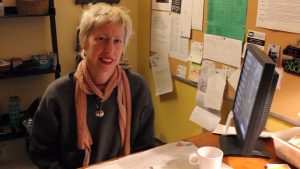Video series exposes Windsor’s youth homelessness

Tamara Kowalski has created a 13-part video series to highlight the problems at-risk youth face in Windsor.
“There was, quite literally, nowhere for people to go.”
You can’t mistake the passion of Tamara Kowalska, who founded the Windsor Youth Centre six years ago after seeing at-risk youth slipping through the cracks.
Now, Kowalska has created a 13-part video series that exposes youth homelessness and the problems these youth face right here in Windsor. The first of the 13-part series was released on Nov. 27 and explores parental abuse.
“A lot of [young] people come through this door and they just open up their hearts, so having access to that and then watching the really unreasonable way people are treated just got to me,” she says.
The feedback so far has been that the video is powerful.
“I think people are taken aback,” says Kowalska. “People are paying attention.”
Even the video’s producers, Stevin Agouba and Jendo Shabo at Moon Jump Productions, were not expecting to hear the stories they heard.
“I didn’t think it was this bad, I was just blind to it … people just telling their stories. It was an eye opener,” says Agouba. “It made me change the way I see Windsor, just seeing them and remembering what story they told.”
Shabo says some of the stories they heard they couldn’t even film, due to the laws surrounding what kinds of material can be used as commercials or advertisements.
“That’s pretty heartbreaking, there’s stuff you can’t film it’s so bad,” he says.
The WYC began by offering the basics, such as toiletries, meals and bus tickets. It has since expanded its programming to better cater to youth needs.
“Housing, food, advocacy sometimes with landlord-tenant issues, better access to income and income supports like social assistance,” says Kowalska.
The list goes on.
Kowalskahas also realized – to her frustration – these issuesareoften complicated by other factors including that the young people belong to disadvantaged groups such as the LGBTQ community and racial minorities. Some even speak English as a second language.
She wants everyone in Windsor-Essex to be better educated.
“Not only do homeless youth or young people living in poverty have to deal with the serious difficulties of not having food, not having a place to live, not having even anyone to turn to and feeling absolutely alone, but on top of that they have to deal with the kinds of judgement and bias that’s thrown at them constantly because of the stereotypes around young people and the stereotypes around people living in poverty and the stereotypes around people who are homeless,” says Kowalska.
Shabo hopes the videos can have an impact on the support the WYC receives.
“Hopefully it urges them [the viewer] to help, whether it’s sharing the videos so other people can see it or even donating to the WYC.”
Kowalska says the goal of the campaign was two-fold.
“It’s intended to both help us be sustainable,” explains Kowalska, “But also to show the truth behind why youth end up on the streets or homeless and the very real dangers and difficulties that are involved with not having a home.”
The video series uses real Windsor youth – their stories and their presence as actors and production crew. Kowalska says it was important to her that all participants, including the producers themselves, are under the age of 30, highlighting the WYC’s mandate to keep the focus on Windsor youth.
“We’re trying to give homeless youth a voice. We want to tell the truth.”


